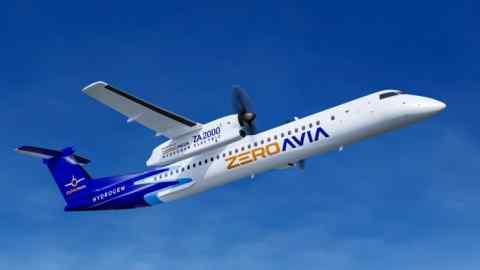Stay informed with free updates
Simply sign up to the Climate change myFT Digest — delivered directly to your inbox.
A Virgin Atlantic plane powered by a blend of waste cooking oil, animal fats and other unorthodox fuels landed in New York on Tuesday, after a flight from London Heathrow that the aviation industry hailed as a milestone in its complex and controversial push to decarbonise.
The journey is the first time a commercial airline has operated a long-haul flight entirely powered by so-called sustainable aviation fuels (SAF), which emit less carbon over their lifecycle than traditional jet fuel.
While the tailpipe of the Boeing 787 still released the same amount of CO₂ as normal jet fuel, net emissions from the unmodified Rolls-Royce engines run on waste products were expected to be about 70 per cent lower than a normal trip over the north Atlantic using fossil fuel from the ground.
Sir Richard Branson, Virgin Atlantic’s co-founder on board the flight, said during the journey: “I was just thinking of my histories of firsts across the Atlantic and all my previous ones I’ve ended up being pulled out of the sea, whether it is ballooning or boating. So I am very glad this will be my first time . . . that will land at an airport.”
With breakthrough technologies like hydrogen or electric-powered flights years away, the industry is banking on using new fuels to reach their commitment to hit net zero by 2050, while continuing to pursue growth in the coming decades.
However environmentalists and some scientists have questioned whether these alternative fuels are really sustainable at all, arguing that flying less is the only way to genuinely cut emissions.
Some have also warned these publicity flights distract from the problems facing decarbonising flying, as the industry also focuses on growing in the coming decades. SAF currently represents less than 0.1 per cent of global jet fuel volumes.
Sustainable aviation fuels currently represent less than 0.1% of global jet fuel volumes © Benoit Tessier/Reuters
Flying is responsible for about 5 per cent of the world’s greenhouse gas emissions, and the aviation industry faces a difficult journey to wean itself off the fossil fuels that power jet engines.
Other sources of sustainable fuels being explored include biomass which absorbed CO₂ when it was alive, while in the longer term, the industry hopes to scale up nascent technology to create cleaner fuel by combining co2 sourced from the air with green hydrogen, using renewable electricity. All these fuels are significantly more expensive than kerosene
“The idea this is some landmark event that is going to revolutionise flying is clearly not the case,” said Tim Johnson, director of the Aviation Environment Federation, a campaign group.
“The vast majority of aviation emissions are still going to come from kerosene for the foreseeable future,” he said.
Johnson questioned whether many of the current feedstocks used in SAFs were truly sustainable, pointing to worries about land use for crops, the scalability of materials such as animal fats or waste oils, and the amount of renewable energy needed in the production of the cleanest fuels.
Industry bosses rebutted this but are anxious about the comparatively low production levels of SAF despite regulatory efforts to stimulate output, ranging from a fuel mandate in the EU to tax incentives in the US.
“There’s simply not enough SAF,” Virgin Atlantic chief executive Shai Weiss said. “It’s clear that in order to reach production at scale, we need to see significantly more investment.”
Annual SAF production tripled in 2022 to 300mn litres from the previous year, according to trade group Iata. But aviation will need about 450bn litres a year of sustainable aviation fuel by 2050 to hit its net zero commitment.
Recommended
EU transport commissioner Adina Valean voiced concerns earlier this month that scaling up of production had yet to happen.
“I am worried because first and foremost we can see there are not enough volumes of SAF [being produced],” she said.
Fuel industry executives which produce SAF said more guarantees were needed over future demand.
“There is demand for sure . . . but are those demand signals sufficient for investment at scale? There is still a lot of uncertainty and risk we are all working through,” said Fede Berra, the chief executive of BP’s aviation division.
BP plans to increase production to 100,000 barrels a day by 2030, but some smaller producers are struggling. Shares in London-listed sustainable fuel specialist Velocys have tumbled 95 per cent this year as it faced a cash crunch.
Industry bosses are aware they will ultimately face more regulation to control the growth in flying if they cannot win the argument on SAFs.
“In order for the sector to have social licence to grow we need to see net declines in carbon emissions,” said Jack Duckworth, a partner at LEK Consulting, which advises transport companies.
Climate Capital
Where climate change meets business, markets and politics. Explore the FT’s coverage here.
Are you curious about the FT’s environmental sustainability commitments? Find out more about our science-based targets here
Checkout latest world news below links :
World News || Latest News || U.S. News
The post First transatlantic flight powered by cooking and animal fats lands in New York appeared first on WorldNewsEra.

